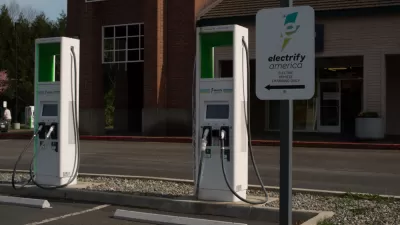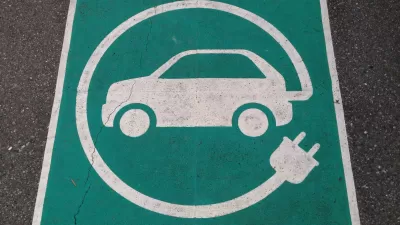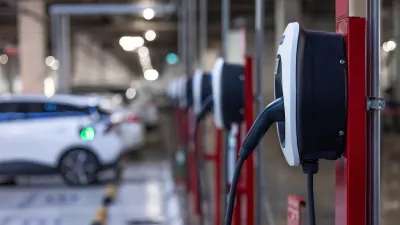More electric vehicles on the road will mean more demand for charging stations where drivers can power up away from home.

"With carmakers and state and federal government entities increasingly looking to combat carbon emissions with electric vehicles, one of the major sticking points to their widespread adoption remains the nation’s undersized and spotty charging infrastructure." As Planetizen previously covered, more private companies are stepping in to fill the gap and position themselves as key players in the growing electric infrastructure industry.
Jamie Lincoln Kitman reports on one such company, Charge, which "is offering a nationwide soup-to-nuts service that provides siting, planning, permitting and construction of E.V. charging stations."
"According to the Energy Department, there are roughly 50,000 (overnight or workday) Level 2 charger locations in service in the United States and Canada, and about 7,000 Level 3 fast charger locations, of which 1,400 are part of Tesla’s supercharging network," far short of the 500,000 proposed by President Biden and the millions needed to provide comprehensive coverage. Kitman writes that "Mr. Fox and Mr. LaNeve anticipate that eight million to 10 million chargers will be installed across the country over the next 15 or so years. They foresee a constantly changing parade of new technologies and a broad array of places where charging stations might be located, including hotels, supermarkets, health clubs and office buildings."
In the article, Charge chief executive Andrew Fox likens EV charging to cell phone coverage. "It’s like if you were trying to use a cellphone to go cross-country 30 years ago. You got expensive charges for roaming, you got dropped calls." Now, coverage is, for the most part, ubiquitous.
FULL STORY: When Electric Cars Rule the Road, They’ll Need Spots to Power Up

Planetizen Federal Action Tracker
A weekly monitor of how Trump’s orders and actions are impacting planners and planning in America.

Maui's Vacation Rental Debate Turns Ugly
Verbal attacks, misinformation campaigns and fistfights plague a high-stakes debate to convert thousands of vacation rentals into long-term housing.

San Francisco Suspends Traffic Calming Amidst Record Deaths
Citing “a challenging fiscal landscape,” the city will cease the program on the heels of 42 traffic deaths, including 24 pedestrians.

Defunct Pittsburgh Power Plant to Become Residential Tower
A decommissioned steam heat plant will be redeveloped into almost 100 affordable housing units.

Trump Prompts Restructuring of Transportation Research Board in “Unprecedented Overreach”
The TRB has eliminated more than half of its committees including those focused on climate, equity, and cities.

Amtrak Rolls Out New Orleans to Alabama “Mardi Gras” Train
The new service will operate morning and evening departures between Mobile and New Orleans.
Urban Design for Planners 1: Software Tools
This six-course series explores essential urban design concepts using open source software and equips planners with the tools they need to participate fully in the urban design process.
Planning for Universal Design
Learn the tools for implementing Universal Design in planning regulations.
Heyer Gruel & Associates PA
JM Goldson LLC
Custer County Colorado
City of Camden Redevelopment Agency
City of Astoria
Transportation Research & Education Center (TREC) at Portland State University
Jefferson Parish Government
Camden Redevelopment Agency
City of Claremont





























